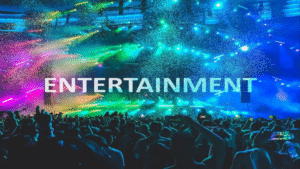
Entertainment has been an inseparable part of human history, evolving with each generation. From ancient storytelling around campfires to modern digital streaming, the purpose remains the same: to inspire, amuse, and connect us. Today, World of entertainment isn’t limited to cinema and music; it spans gaming, podcasts, social media, and live events. It shapes culture and mirrors society’s dreams, struggles, and progress. Every song we hear, movie we watch, or game we play adds a new color to this vibrant mosaic. And despite changes in format, the human need for storytelling and shared experiences continues to thrive.
Streaming platforms have completely transformed how we consume content. No longer tied to TV schedules, audiences enjoy the freedom to watch what they love anytime, anywhere. Binge-watching entire seasons has become a cultural norm, changing both viewer habits and industry strategies. Streaming services now produce original shows and films to compete for subscribers’ attention. This competition fuels creativity, bringing fresh stories and diverse voices to screens worldwide. As technology advances, the gap between creator and audience narrows, creating a dynamic entertainment landscape.
Music, too, has undergone a revolution in the digital era. Gone are the days of waiting for physical album releases; now, songs debut instantly on global platforms. Social media helps tracks go viral within hours, turning unknown artists into stars overnight. Genres blend freely, giving birth to unique sounds that cross cultural boundaries. Playlists have replaced traditional albums, catering to every mood and moment. This democratization empowers artists and offers listeners a richer, more personal experience. Music’s power to unite and express remains as strong as ever.
Gaming has risen from niche hobby to mainstream entertainment giant. Video games today feature cinematic storytelling, realistic graphics, and expansive virtual worlds. Online multiplayer modes connect millions of players globally, creating vibrant digital communities. Esports tournaments draw stadium crowds and streaming audiences in the millions, rivaling traditional sports. Gaming isn’t just play—it’s storytelling, competition, and social connection rolled into one. As technology introduces VR and AR, gaming’s future looks even more immersive and boundary-breaking.
Live entertainment retains a unique magic despite digital alternatives. Concerts, theater shows, and festivals offer an energy that screens can’t replicate. The shared atmosphere of cheering crowds, live music, and spontaneous moments create memories that last a lifetime. Event organizers now blend technology with tradition, adding interactive visuals and augmented reality to shows. This blend keeps live experiences fresh and appealing to younger audiences raised on digital content. Ultimately, nothing matches the thrill of witnessing creativity unfold live.
Podcasts and audiobooks have carved a strong niche in modern entertainment. They fit seamlessly into busy lifestyles, turning commutes and chores into opportunities to learn, laugh, or unwind. From true crime to self-help, history to humor, there’s something for every listener. Audio formats allow for intimate storytelling that sparks imagination without visual distractions. Independent creators thrive alongside established media, giving listeners diverse perspectives. The quiet rise of audio entertainment proves that stories can resonate powerfully, even without a screen.
Animation, once seen as purely for children, now enjoys universal appeal. Studios like Pixar, DreamWorks, and anime creators craft stories layered with humor, emotion, and deep themes. Animation’s flexibility brings impossible worlds and characters to life, transcending language and age barriers. Its visual artistry captivates both casual viewers and critics alike. Modern animated films tackle complex issues like family, identity, and courage, proving cartoons can be both entertaining and thought-provoking. Animation’s growing influence reflects a broader embrace of creativity in all forms.
The rise of celebrity culture has shifted dramatically with social media. Stars now share daily glimpses into their lives, fostering a sense of connection with fans worldwide. This direct access humanizes celebrities, but also adds pressure to maintain constant engagement. Viral moments, both good and bad, spread rapidly, shaping reputations overnight. While some see this as authentic transparency, others criticize it for fueling unrealistic expectations. Either way, the relationship between fans and famous figures has become closer—and more complex—than ever.
Nostalgia plays a powerful role in today’s entertainment choices. Remakes, reboots, and sequels revisit beloved stories, appealing to older fans and attracting new ones. From classic cartoons revived with modern animation to movie franchises returning decades later, nostalgia sells. It offers comfort in a fast-changing world and reminds audiences of simpler times. At the same time, fresh interpretations keep stories relevant and culturally updated. This delicate balance between honoring the past and embracing the future keeps familiar worlds alive.
Global diversity has become a defining strength of modern entertainment. International hits like Korean dramas, Spanish thrillers, and Bollywood films prove great stories transcend language. Streaming platforms help content from different countries find worldwide audiences, breaking cultural barriers. This exposure fosters appreciation for new perspectives, storytelling styles, and traditions. It’s an exciting era where viewers explore worlds far beyond their own borders. Diversity not only entertains but educates, bridging gaps through shared human experiences.
Technology keeps reshaping entertainment in unexpected ways. Virtual reality transports users into digital worlds; augmented reality blends digital content into real life. AI assists in content creation, from scripts to visual effects. These tools open doors for creators to experiment and audiences to experience stories interactively. As devices become more accessible, immersive entertainment will likely become part of daily life. The future promises even richer, more personal storytelling experiences.
At its heart, entertainment remains about connection. Whether through laughter, music, games, or shared memories, it brings people together across time and distance. Trends, technologies, and formats will change, but the desire to tell and hear stories endures. In a world often divided, entertainment reminds us of our shared humanity and the power of imagination to unite us. As new ideas and innovations emerge, the magic of entertainment will continue to inspire, comfort, and bring joy to generations to come.







